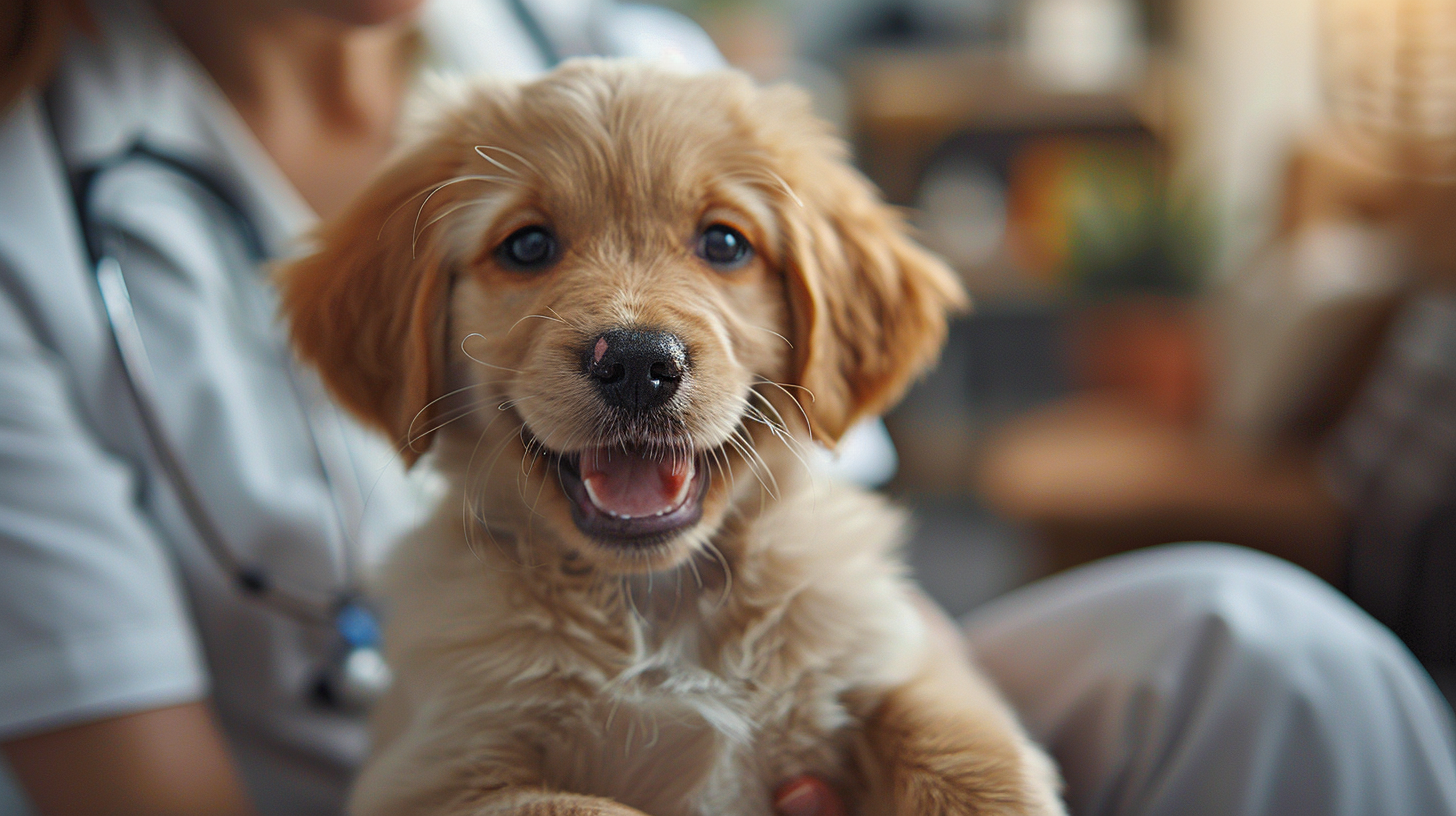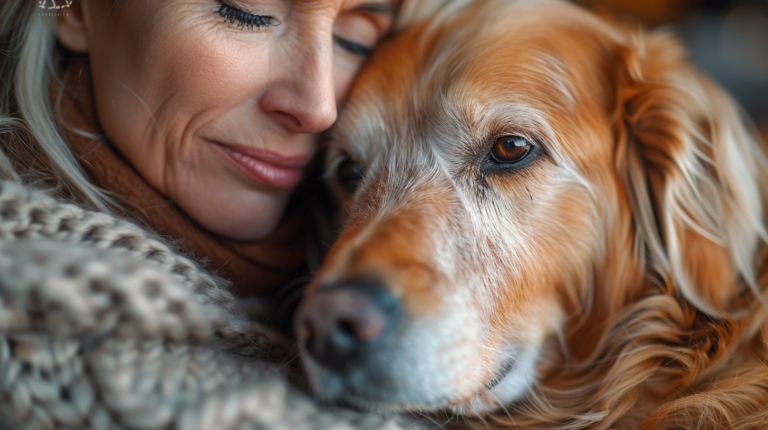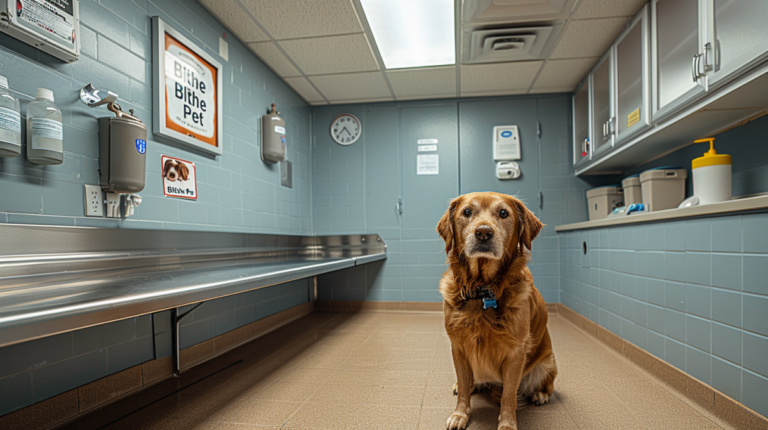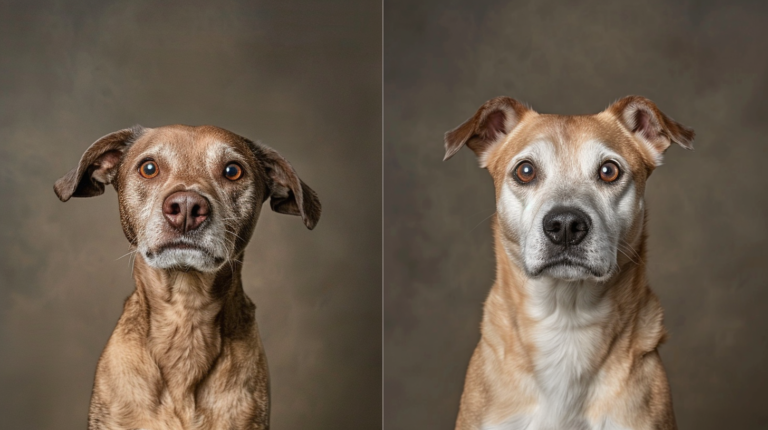Discover the complete pet vaccination schedule guide by life stage. Learn essential timing for dog & cat vaccines, understand core vs. non-core options, and create a customized plan for optimal protection.
Table of Contents
Introduction: Understanding Your Pet Vaccination Schedule

Establishing and following a proper pet vaccination schedule is one of the most important responsibilities of pet ownership. Vaccines protect your beloved companions from serious and sometimes fatal diseases, serving as a crucial cornerstone of preventative healthcare. Just like humans, pets require different immunizations at various life stages to maintain optimal health and immunity.
This comprehensive guide will walk you through the essential pet vaccination schedules for dogs, cats, and other common household pets from puppyhood/kittenhood through their senior years. We’ll explore core vaccines versus non-core options, timing considerations, potential side effects to monitor, and how to work with your veterinarian to create a customized vaccination plan that fits your pet’s specific lifestyle and risk factors.
Whether you’re a first-time pet parent or a seasoned animal lover looking to ensure your furry family members receive the most up-to-date preventative care, this guide will provide you with the knowledge needed to make informed decisions about your pet’s vaccination needs throughout their lifetime.
The Importance of Pet Vaccinations

Vaccinations represent one of veterinary medicine’s greatest achievements, drastically reducing the prevalence of deadly diseases that once claimed countless pet lives. A well-planned pet vaccination schedule serves multiple crucial purposes:
Disease Prevention for Individual Pets
Vaccines stimulate your pet’s immune system to recognize and fight specific pathogens. When exposed to these diseases later in life, vaccinated pets can mount a rapid and effective immune response, often preventing illness entirely or significantly reducing its severity.
According to the American Veterinary Medical Association (AVMA), vaccines have helped to nearly eradicate once-common diseases like distemper in dogs and panleukopenia in cats in areas with high vaccination rates.
Community Protection Through Herd Immunity
When a significant percentage of pets in a community are vaccinated, disease transmission becomes much more difficult. This creates what epidemiologists call “herd immunity,” which helps protect vulnerable animals who cannot be vaccinated due to age, health conditions, or other factors.
Cost-Effective Healthcare Management
The cost of preventing disease through vaccination is substantially lower than treating the diseases themselves. For example, treating a severe case of parvovirus in puppies can cost between $1,000-$4,000, while the parvovirus vaccine typically costs $20-45 as part of a routine vaccination visit.
Dr. Sarah Johnson, DVM and veterinary immunologist at Cornell University College of Veterinary Medicine, emphasizes: “Implementing a proper vaccination protocol is truly one of the most cost-effective interventions we can make as pet owners. The financial investment is minimal compared to the tremendous protective benefits conferred.”
Core vs. Non-Core Vaccines Explained

Not all vaccines are created equal when it comes to your pet’s health. Understanding the difference between core and non-core vaccines is essential for creating an appropriate pet vaccination schedule.
Core Vaccines: Essential Protection
Core vaccines protect against severe, widespread diseases that pose significant health risks and are recommended for all pets regardless of lifestyle or geographic location.
For Dogs:
- Rabies: Required by law in most jurisdictions; fatal to pets and humans
- Distemper: Highly contagious viral disease affecting multiple body systems
- Parvovirus: Severe gastrointestinal disease with high mortality, especially in puppies
- Adenovirus (Hepatitis): Causes liver disease and respiratory infection
For Cats:
- Rabies: Required by law in many areas; fatal zoonotic disease
- Feline Panleukopenia (Distemper): Highly contagious with high mortality rates
- Feline Calicivirus: Causes respiratory disease and oral ulceration
- Feline Herpesvirus Type 1 (Rhinotracheitis): Primary cause of upper respiratory infections
Non-Core Vaccines: Lifestyle-Based Protection
Non-core vaccines are given based on your pet’s individual risk factors, including:
- Geographic location
- Indoor/outdoor lifestyle
- Exposure to other animals
- Travel habits
- Boarding/daycare/grooming facility requirements
For Dogs:
- Bordetella (Kennel Cough): For dogs frequently exposed to other dogs in boarding, daycare, or training
- Leptospirosis: For dogs with outdoor lifestyles, especially near wildlife or standing water
- Lyme Disease: For dogs in tick-endemic areas
- Canine Influenza: For dogs in outbreak areas or those frequently socializing with other dogs
For Cats:
- Feline Leukemia Virus (FeLV): Recommended for outdoor cats or multi-cat households
- Feline Immunodeficiency Virus (FIV): For cats with outdoor access or in high-risk environments
- Chlamydia: For cats in multi-cat environments where the disease is present
- Bordetella: For cats entering boarding facilities or shelters
Vaccination Decision Framework
The American Animal Hospital Association (AAHA) and the American Association of Feline Practitioners (AAFP) provide these guidelines for determining which vaccines your pet needs:
- Risk Assessment: Evaluate exposure risk based on lifestyle factors
- Regional Prevalence: Consider disease prevalence in your geographic area
- Age and Health Status: Account for individual pet health factors
- Duration of Immunity: Follow appropriate revaccination intervals
- Legal Requirements: Adhere to local laws (especially for rabies)
Puppy & Kitten Vaccination Schedule (0-16 weeks)

The first few months of your pet’s life are critical for building immune protection through a carefully timed pet vaccination schedule. Young animals are especially vulnerable to infectious diseases due to their developing immune systems and the gradual waning of maternal antibodies.
Why Multiple Vaccinations Are Necessary
Puppies and kittens receive temporary immunity from their mothers through maternal antibodies transferred in utero and through nursing (colostrum). These antibodies provide valuable protection but also interfere with vaccines, potentially neutralizing them before they can stimulate the baby animal’s immune system.
Since maternal antibodies decrease at different rates in individual animals (typically between 6-16 weeks), veterinarians administer a series of vaccinations to ensure protection as maternal antibodies fade. This approach maximizes the chance of successful immunization.
Standard Puppy Vaccination Schedule
| Age | Core Vaccines | Optional Non-Core Vaccines |
| 6-8 weeks | Distemper • Parvovirus • Adenovirus/Hepatitis | Bordetella • Parainfluenza |
| 10-12 weeks | Distemper • Parvovirus • Adenovirus/Hepatitis • First rabies vaccine (if required by law) | Leptospirosis • Lyme disease • Canine influenza |
| 14-16 weeks | Distemper • Parvovirus • Adenovirus/Hepatitis • Rabies (if not given earlier) | • Complete any series of non-core vaccines |
Standard Kitten Vaccination Schedule
| Age | Core Vaccines | Core Vaccines |
| 6-8 weeks | FVRCP (Feline viral rhinotracheitis, calicivirus, panleukopenia) | FeLV (for outdoor/at-risk kittens) |
| 10-12 weeks | FVRCP booster | FeLV booster • Chlamydia (in multi-cat environments) |
| 14-16 weeks | FVRCP final kitten booster • Rabies | FeLV (for outdoor/at-risk kittens) |
Special Considerations for Young Animals
- Deworming: Usually performed alongside vaccinations as intestinal parasites are common in young animals
- Nutrition: High-quality diet supports immune function and vaccine response
- Socialization: Limited to vaccinated pets until vaccination series is complete
- Stress Reduction: Minimize stress around vaccination appointments as stress can temporarily suppress immune function
According to the 2023 study in the Journal of Veterinary Medicine, puppies who complete their full vaccination series by 16 weeks have a 98.7% protective antibody titer against parvovirus, compared to only 64% protection in puppies with incomplete vaccination series.
Adolescent Pet Vaccination Schedule (4-12 months)
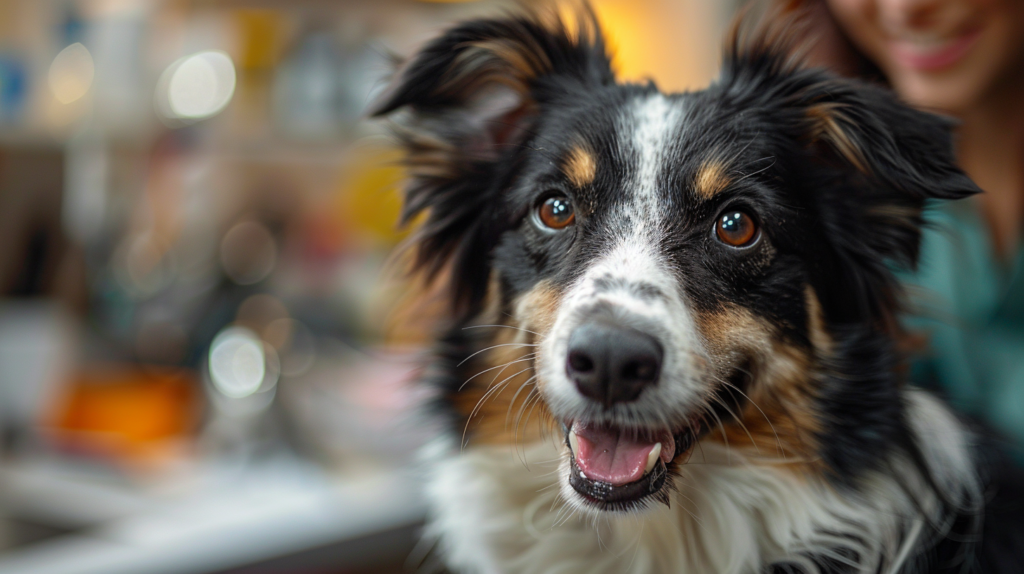
The transition from puppyhood or kittenhood to adolescence marks an important milestone in your pet’s vaccination schedule. During this period, your pet will typically receive booster shots to reinforce immunity established during their initial vaccination series.
Key Adolescent Vaccines and Timing
For Dogs (4-12 months):
- First Annual Boosters: At approximately one year of age, puppies receive boosters for core vaccines
- Rabies Booster: Depending on the type of rabies vaccine used initially (1-year vs. 3-year) and local regulations
- Assessment of Non-Core Needs: Reevaluation of lifestyle factors to determine which non-core vaccines may be necessary
For Cats (4-12 months):
- FVRCP Booster: Given at one year of age
- Rabies Booster: Typically at one year of age, then following local regulations
- FeLV Consideration: For cats with outdoor access or living in multi-cat households
Spay/Neuter Timing and Vaccinations
Many veterinarians coordinate vaccination boosters with spay/neuter procedures to minimize the number of veterinary visits. Current research suggests potential benefits to waiting until after sexual maturity for some breeds, particularly larger dog breeds. Your veterinarian can help determine the optimal timing for both vaccinations and sterilization procedures based on your pet’s specific breed, size, and health considerations.
The Transition to Adult Vaccination Protocols
During adolescence, your veterinarian will begin to transition your pet to an adult vaccination schedule. This typically means:
- Moving from frequent puppy/kitten vaccines to annual or triennial schedules
- Establishing a personalized risk assessment
- Creating a long-term vaccination strategy
Veterinary behaviorist Dr. Michael Richards notes: “Adolescence is an ideal time to establish a relationship with a primary veterinarian who can monitor your pet’s individual needs throughout their life. The vaccination strategy established during this period often serves as the foundation for your pet’s lifetime preventative care plan.”
Adult Pet Vaccination Schedule (1-7 years)
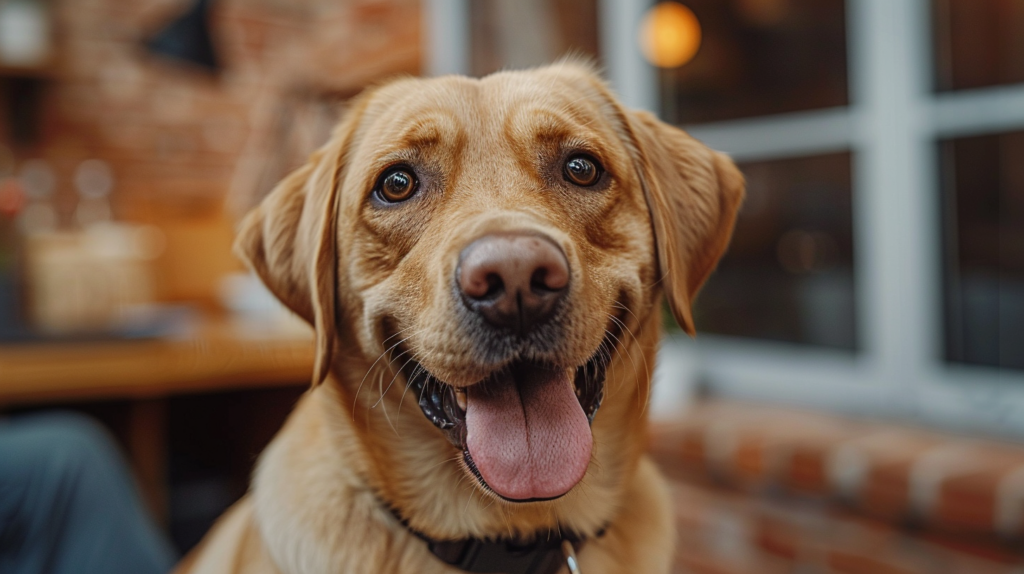
Adult pets require ongoing vaccinations, though at less frequent intervals than puppies and kittens. A proper adult pet vaccination schedule balances optimal disease protection while avoiding over-vaccination.
Modern Approach to Adult Vaccination Protocols
Veterinary medicine has evolved significantly in its approach to adult vaccinations. Rather than automatically administering all vaccines annually, today’s evidence-based protocols focus on:
- Duration of Immunity: Research showing many vaccines provide protection for 3+ years
- Titer Testing: Blood tests measuring antibody levels to determine if revaccination is necessary
- Risk-Based Assessment: Evaluation of lifestyle, environment, and exposure risk
- Individual Health Considerations: Adjustments based on medical history and current health status
Standard Adult Dog Vaccination Schedule
| Vaccine | Frequency | Considerations |
| Rabies | Every 1-3 years (per local law) | Required by law in most jurisdictions |
| DHPP (Distemper, Hepatitis, Parainfluenza, Parvovirus) | Every 3 years after initial adult booster | Core protection for all dogs |
| Bordetella | Every 6-12 months | For dogs that board, attend daycare, or frequently socialize |
| Leptospirosis | Annually | For dogs with outdoor access, especially near water or wildlife |
| Lyme Disease | Annually | For dogs in endemic areas or those frequently exposed to ticks |
| Canine Influenza | Annually | For social dogs in areas with outbreaks |
Standard Adult Cat Vaccination Schedule
| Vaccine | Frequency | Considerations |
| Rabies | Every 1-3 years (per local law) | Required in many areas |
| FVRCP (Rhinotracheitis, Calicivirus, Panleukopenia) | Every 3 years after initial adult booster | Core protection for all cats |
| FeLV (Feline Leukemia) | Annually for at-risk cats | Recommended for outdoor cats and those in multi-cat households |
| FIV (Feline Immunodeficiency Virus) | Not routinely given to adult cats | May be considered in high-risk situations |
Titer Testing as an Alternative
Titer testing measures the concentration of specific antibodies in the blood, indicating whether a pet has sufficient immunity against particular diseases. Many veterinarians now offer titer testing as an alternative to automatic revaccination.
Benefits of titer testing include:
- Avoiding unnecessary vaccinations
- Reducing the risk of adverse reactions
- Providing peace of mind regarding protection status
- Identifying pets that may not have responded adequately to previous vaccinations
According to a 2022 study published in the Journal of Veterinary Internal Medicine, over 90% of dogs maintained protective antibody levels against parvovirus and distemper for at least three years after vaccination, supporting the move toward extended vaccination intervals.
Combining Vaccination with Wellness Care
Adult pet vaccinations are typically administered during annual wellness examinations, creating an opportunity for comprehensive preventative care including:
- Physical examination
- Dental assessment
- Parasite screening
- Weight and nutrition evaluation
- Behavior discussion
This integrated approach ensures that all aspects of your pet’s health are monitored regularly, even if vaccines are administered less frequently than in the past.
Senior Pet Vaccination Schedule (8+ years)
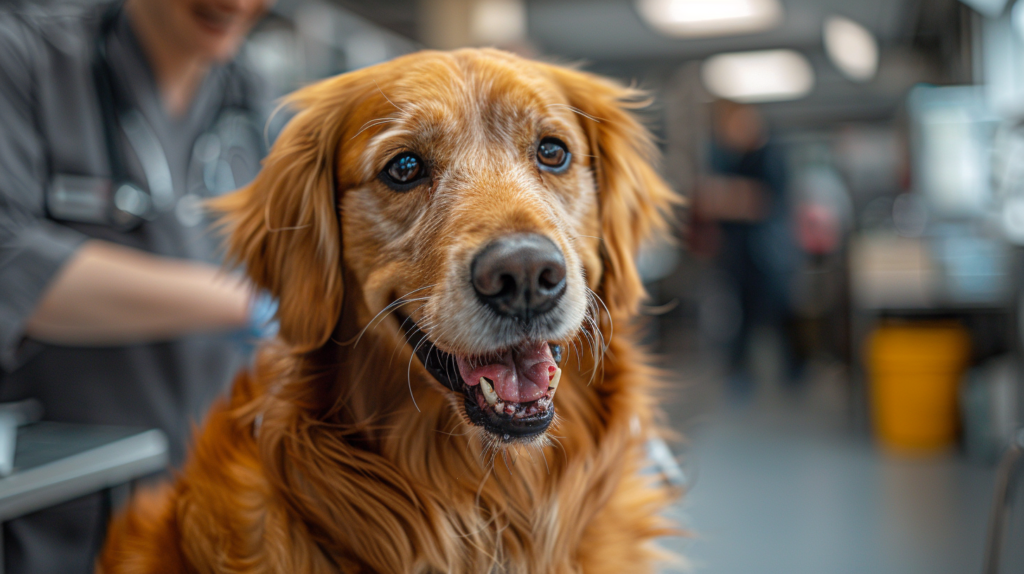
As pets enter their golden years (generally around age 8 for larger dogs, age 10 for smaller dogs and cats), their vaccination schedule may require adjustments to accommodate age-related changes in immune function and overall health status.
Age-Related Immune Considerations
Senior pets often experience immune senescence—age-related changes in immune function that can manifest as:
- Decreased response to vaccines
- Increased susceptibility to infections
- Greater risk of adverse vaccine reactions
- Co-existing medical conditions that may affect vaccination decisions
Risk-Benefit Analysis for Senior Pets
The American Animal Hospital Association (AAHA) and American Association of Feline Practitioners (AAFP) recommend a more individualized approach to vaccinating senior pets, carefully weighing:
- Continued Disease Risk: Assessment of exposure potential based on lifestyle
- Health Status: Evaluation of chronic conditions that might affect immune response
- Previous Vaccination History: Consideration of lifetime immunity from prior vaccines
- Adverse Reaction History: Review of any previous vaccination reactions
Modified Senior Dog Vaccination Protocol
| Vaccine | Recommendation | Special Considerations |
| Rabies | Continue as required by law | May request medical exemption in some jurisdictions if medically necessary |
| Core Vaccines (DHPP) | Every 3 years or based on titer results | Consider titer testing to minimize vaccination |
| Non-Core Vaccines | Individualized based on exposure risk | Discontinue vaccines for diseases with minimal exposure risk |
Modified Senior Cat Vaccination Protocol
| Vaccine | Recommendation | Special Considerations |
| Rabies | Continue as required by law | Medical exemptions may be available in some areas |
| FVRCP | Every 3 years or based on titer results | Consider reduced antigen or recombinant options |
| FeLV | Generally discontinued unless high risk | Rarely needed for indoor-only senior cats |
Veterinary Monitoring During Vaccination
Senior pet vaccinations should include:
- Pre-vaccination physical examination
- Consideration of pre-vaccination bloodwork to assess organ function
- Extended observation period after vaccination
- Scheduling vaccines separate from other procedures when possible
Veterinary geriatric specialist Dr. Elizabeth Patterson explains: “While we still want to protect senior pets from preventable diseases, we take a much more measured approach to vaccination. The goal is to maintain protection while acknowledging that an aging immune system may respond differently to vaccines and may have a higher risk of adverse effects. We often employ a ‘less is more’ philosophy, focusing on core vaccines and those specifically needed based on the senior pet’s lifestyle.”
Small Mammal & Exotic Pet Vaccinations
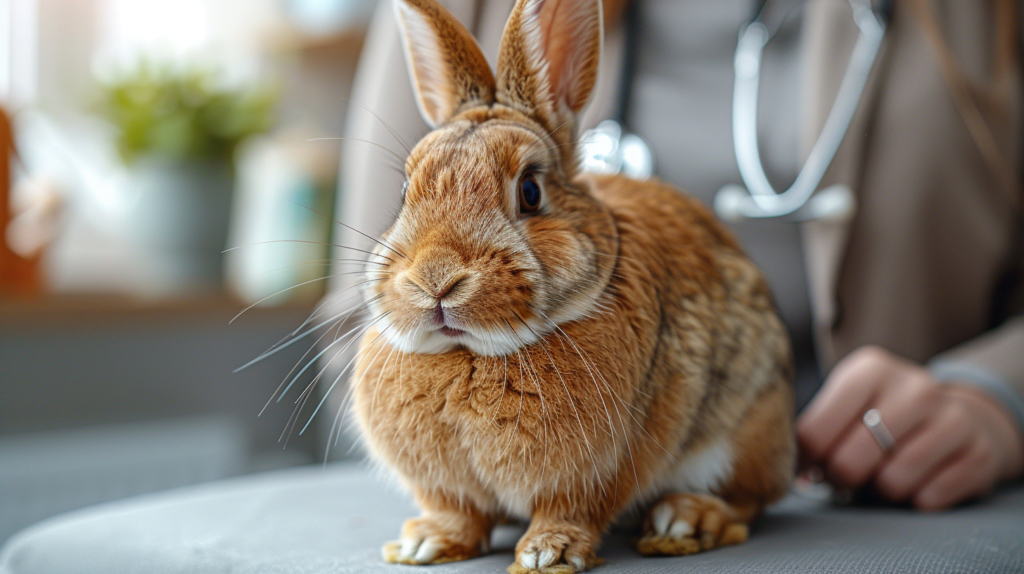
While dogs and cats have well-established vaccination schedules, other household pets may require different approaches to disease prevention. Here’s what pet parents should know about vaccination needs for common small mammals and exotic pets.
Rabbits
Domestic rabbits are susceptible to two highly lethal viral diseases that can be prevented through vaccination:
Rabbit Hemorrhagic Disease Virus (RHDV):
- Highly contagious and often fatal virus affecting wild and domestic rabbits
- Vaccination schedule: Initially two doses 3-4 weeks apart, then annual boosters
- Recommended for: All domestic rabbits, especially in outbreak areas
Myxomatosis:
- Severe viral disease spread by mosquitoes and direct contact
- Vaccination schedule: Annual vaccination in endemic areas
- Availability note: The myxomatosis vaccine is not currently available in the United States but is used in many other countries
A 2023 survey conducted by the House Rabbit Society found that only 22% of rabbit owners were aware of RHDV vaccination recommendations, highlighting the need for better education about rabbit preventative care.
Ferrets
Ferrets are highly susceptible to several diseases that also affect dogs:
Rabies:
- Required by law in most states for ferrets
- Schedule: Initially at 12-14 weeks of age, then annually
- Use only ferret-approved rabies vaccines
Distemper:
- Extremely lethal in ferrets with nearly 100% mortality
- Schedule: Series of 3 vaccines starting at 8 weeks, then annual boosters
- Use only ferret-approved distemper vaccines
Guinea Pigs
There are currently no commercially available vaccines routinely recommended for guinea pigs in the United States. Disease prevention focuses on:
- Regular veterinary examinations
- Proper hygiene and husbandry
- Quarantine of new animals before introduction
Hamsters, Gerbils, Mice, and Rats
These small rodent pets generally do not receive vaccinations as part of their routine healthcare. Protection from disease relies on:
- Clean living environment
- High-quality nutrition
- Stress reduction
- Limited exposure to unknown animals
Birds
Most pet birds do not receive routine vaccinations in the United States. However, in some countries and specific situations, vaccines may be available for:
- Polyomavirus: Primarily for young breeding birds in aviary settings
- Psittacine Beak and Feather Disease (PBFD): Available in some countries for at-risk psittacine birds
- Pacheco’s Disease: Sometimes used in aviary settings during outbreaks
Reptiles
There are currently no commercial vaccines routinely used in pet reptiles. Disease prevention focuses on:
- Proper habitat setup with appropriate temperature gradients
- UV lighting when species-appropriate
- Optimal nutrition
- Regular parasite screening
- Quarantine procedures for new animals
Exotic animal veterinarian Dr. Susan Horton emphasizes: “While traditional vaccines may not be available for many exotic pets, disease prevention remains crucial. For these species, prevention focuses heavily on optimal husbandry, nutrition, and environmental management—essentially creating conditions that naturally support a strong immune system and minimize disease exposure.”
Vaccination Costs & Insurance Considerations
Understanding the financial aspects of maintaining your pet’s vaccination schedule can help you plan appropriately and ensure your companion receives necessary preventative care throughout their life.
Average Vaccination Costs
Vaccination costs vary significantly based on geographic location, veterinary practice, and whether vaccines are administered individually or as part of packages. The following represents average price ranges in the United States as of 2025:
For Dogs:
| Vaccine | Average Cost Range | Frequency |
| Rabies | $15-$25 | Every 1-3 years |
| DHPP (Core combo) | $25-$50 | Every 1-3 years |
| Bordetella | $20-$45 | Every 6-12 months |
| Leptospirosis | $15-$35 | Annually |
| Lyme Disease | $20-$40 | Annually |
| Canine Influenza | $25-$45 | Annually |
For Cats:
| Vaccine | Average Cost Range | Frequency |
| Rabies | $15-$25 | Every 1-3 years |
| FVRCP (Core combo) | $25-$45 | Every 1-3 years |
| FeLV | $25-$45 | Annually if needed |
| FIV | $25-$50 | Not routinely given |
Additional Costs to Consider:
- Examination fees ($45-$75) often apply when vaccines are administered
- Titer testing ($45-$150 per disease) if used instead of automatic revaccination
- Initial puppy/kitten series are more expensive due to multiple visits
- Mobile or low-cost vaccine clinics may offer reduced pricing
According to the American Pet Products Association’s 2024 survey, dog owners spend an average of $225-$400 annually on preventative veterinary care, including vaccinations, while cat owners spend approximately $160-$300.
Pet Insurance Coverage for Vaccines
Pet insurance policies vary widely in their coverage of preventative care, including vaccinations:
Standard Accident and Illness Policies:
- Typically do NOT cover routine vaccinations
- Focus on unexpected illnesses and injuries
Wellness/Preventative Care Add-ons:
- Additional coverage that can be purchased with most policies
- Usually covers a portion of vaccination costs
- May be structured as scheduled benefits (specific dollar amounts) or percentage reimbursements
- Average cost: $10-$30 additional monthly premium
Standalone Wellness Plans:
- Offered by some veterinary practices or companies
- Cover vaccines and other preventative services
- Often work as discount programs or amortized payment plans
- Not true insurance but help distribute costs over time
Cost-Saving Strategies for Pet Vaccinations
- Low-Cost Vaccine Clinics:
- Community events often sponsored by shelters or municipal agencies
- May offer vaccines at 30-50% below private practice prices
- Usually do not include comprehensive examination
- Veterinary Schools:
- Teaching hospitals often provide services at reduced rates
- Students perform procedures under licensed veterinarian supervision
- May have income qualification requirements
- Shelter-Affiliated Clinics:
- Many animal shelters operate public clinics with reduced pricing
- Focus on common vaccines and basic preventative care
- May require residency in specific service areas
- Multi-Pet Discounts:
- Some practices offer discounts when vaccinating multiple pets at once
- Can reduce per-pet costs by 10-20%
- Veterinary Membership Programs:
- Monthly subscription services covering routine care including vaccines
- Help distribute costs evenly throughout the year
- Often include additional benefits like free office visits
- Titer Testing:
- May reduce frequency of revaccination for core diseases
- Cost-effective over time for long-lived pets
- Not applicable to vaccines required by law (rabies)
Financial planning expert and pet owner Rebecca Martinez suggests: “Creating a dedicated pet healthcare savings account with small monthly contributions can help manage vaccination and other veterinary costs without stress. Even setting aside $20-30 monthly can cover annual preventative care expenses for most pets.”
Potential Vaccine Reactions & When to Call the Vet
While vaccines are generally safe and vital to your pet’s health, understanding potential reactions and knowing when to seek veterinary care is an important aspect of managing your pet’s vaccination schedule.
Common Mild Vaccine Reactions
Mild reactions typically appear within a few hours of vaccination and resolve within 24-48 hours:
Physical Symptoms:
- Mild soreness or swelling at injection site
- Slight lethargy or decreased activity
- Mild fever (less than 103°F/39.4°C in dogs and cats)
- Reduced appetite for 12-24 hours
- Sneezing or mild nasal discharge (after intranasal vaccines)
Behavioral Changes:
- Increased sleeping
- Reduced playfulness
- Mild irritability
- Seeking more attention or comfort
These mild reactions generally indicate a normal immune response to the vaccine and typically resolve without intervention. The American Veterinary Medical Association reports that these mild reactions occur in approximately 30-50% of vaccinated pets.
Managing Minor Reactions at Home
For mild post-vaccination symptoms, these supportive measures may help:
- Provide quiet, comfortable resting areas
- Ensure access to fresh water
- Monitor temperature if pet seems unusually warm
- Observe the injection site for changes
- Allow normal activity levels based on pet’s comfort
- Avoid strenuous exercise for 24-48 hours
When to Contact Your Veterinarian
Moderate Reactions (Call Your Veterinarian):
- Persistent vomiting or diarrhea
- Significant facial swelling
- Hives or significant itching
- Persistent fever above 103°F/39.4°C
- Significant pain at injection site
- Lameness or difficulty walking
- Behavioral changes lasting more than 48 hours
Severe Reactions (Emergency Situations):
- Collapse or loss of consciousness
- Severe difficulty breathing or respiratory distress
- Seizures
- Pale gums
- Persistent vomiting with inability to keep water down
- Facial or neck swelling that appears to be spreading
According to veterinary emergency specialist Dr. James Cooper: “Anaphylactic reactions, while rare, typically occur within minutes to hours after vaccination. Any signs of breathing difficulty, significant swelling, or collapse warrant immediate emergency care. Don’t wait to see if these symptoms improve on their own.”
Reporting Adverse Vaccine Events
The FDA and vaccine manufacturers collect data on adverse vaccine events to monitor safety and improve products:
- Contact your veterinarian first to report and address the reaction
- Ask your veterinarian to report the event to the manufacturer and appropriate authorities
- Keep detailed records including:
- Vaccine brand, serial number, and administration date
- Timeline of symptoms
- Treatment administered and outcome
- Previous vaccination history
Considerations for Future Vaccinations
If your pet experiences a significant vaccine reaction, your veterinarian may recommend:
- Pre-treatment protocols: Antihistamines or anti-inflammatory medications before vaccination
- Modified vaccination schedule: Administering vaccines individually rather than in combination
- Alternative vaccine brands: Some pets react to specific formulations or adjuvants
- Titer testing: To minimize unnecessary revaccination
- Medical exemptions: In cases of severe reactions, especially for rabies vaccines
- Risk-benefit reassessment: Evaluating if certain non-core vaccines should be discontinued
The 2024 study in Veterinary Immunology and Immunopathology found that pets with previous vaccine reactions had a 30-50% chance of experiencing similar reactions with subsequent vaccinations if no preventative measures were taken, but this risk dropped to under 10% with appropriate pre-vaccination protocols.
Visual Guide: Summarizing Pet Vaccination Schedules
Key Takeaways:
- Customize Based on Lifestyle: Work with your veterinarian to develop a vaccination plan specific to your pet’s needs
- Maintain Records: Keep detailed vaccination records, including dates, vaccine types, and any reactions
- Stay on Schedule: Follow recommended timing for initial series and boosters
- Consider Titer Testing: Discuss antibody testing as an alternative to automatic revaccination
- Monitor for Reactions: Know what to watch for after vaccination appointments
- Regular Reassessment: Review vaccination needs annually as pet age and lifestyle may change
- Follow Local Laws: Ensure compliance with rabies vaccination requirements in your jurisdiction
Frequently Asked Questions
Can my pet receive multiple vaccines at once?
Yes, most healthy pets can safely receive multiple vaccines during a single veterinary visit. However, some veterinarians prefer to separate vaccines, especially for small-breed dogs or pets with previous vaccine reactions. Spacing vaccines 2-3 weeks apart may help identify which vaccine caused a reaction if one occurs and may reduce the overall immune system challenge.
How long after vaccination is my pet protected?
Protection doesn’t develop immediately after vaccination. Most vaccines require 10-14 days to stimulate adequate immunity. Full protection from initial puppy/kitten series isn’t established until 7-10 days after the final dose in the series. This is why veterinarians recommend limiting exposure to unvaccinated animals and high-risk environments until at least two weeks after completing the initial vaccination series.
Can vaccines cause autism in pets?
No scientific evidence supports any link between vaccines and autism or autism-like conditions in pets. Multiple large-scale veterinary studies have found no causal relationship between vaccines and behavioral developmental disorders. The American Veterinary Medical Association, American Animal Hospital Association, and other professional organizations strongly support the safety and efficacy of pet vaccines following recommended protocols.
Are there alternatives to traditional vaccines?
Several alternatives exist with varying levels of acceptance in veterinary medicine:
- Titer testing: Measuring antibody levels to determine if revaccination is necessary
- Homeopathic nosodes: Not scientifically proven effective and not recognized as legal alternatives to required vaccines like rabies
- Recombinant and vectored vaccines: Newer technology vaccines that may reduce adverse reactions
- Split vaccination protocols: Administering vaccines individually rather than in combination
Always discuss alternatives with your veterinarian to ensure your pet maintains proper protection against serious diseases.
Should I vaccinate my indoor-only pet?
Yes, even indoor-only pets should receive core vaccinations. While their risk is lower, exposure can still occur through:
- Screens that don’t prevent insect vectors
- Brief escapes outdoors
- Virus particles carried in on shoes or clothing
- Visits to grooming facilities, boarding kennels, or veterinary offices
- New animals introduced to the household
However, indoor-only pets may require fewer non-core vaccines based on their limited exposure risk.
Can senior pets skip vaccinations?
Senior pets generally shouldn’t skip core vaccinations entirely, but protocols may be modified based on health status and risk assessment. Titer testing can be particularly valuable for senior pets to minimize unnecessary vaccination while ensuring protection. Always consult with your veterinarian about the most appropriate vaccination strategy for your senior pet’s specific situation.
Maintaining Your Pet’s Health Beyond Vaccinations
While following a proper pet vaccination schedule is crucial, it represents just one component of comprehensive preventative healthcare. To ensure your companion’s optimal wellbeing, integrate vaccinations with these additional preventative measures:
- Regular wellness examinations: Semi-annual or annual veterinary checkups
- Parasite prevention: Year-round protection against fleas, ticks, heartworms, and intestinal parasites
- Dental care: Regular home care and professional cleanings
- Proper nutrition: High-quality diet appropriate for species, age, and health conditions
- Weight management: Maintaining healthy body condition
- Mental stimulation: Appropriate enrichment activities
- Grooming and skin care: Regular maintenance appropriate for your pet’s coat type
For more expert pet care tips and product recommendations, visit BlithePet.com your trusted source for pet wellness.
Conclusion
Creating and following an appropriate pet vaccination schedule represents one of the most significant ways you can protect your companion’s health throughout their lifetime. By understanding the core vaccines needed at each life stage, recognizing when non-core vaccines might benefit your specific pet, and working closely with your veterinarian to develop a customized plan, you’re providing crucial protection against serious and potentially fatal diseases.
Remember that vaccination needs evolve throughout your pet’s life, from the intensive initial series during puppyhood or kittenhood to the more measured approach often taken with senior pets. Regular veterinary consultations ensure your vaccination strategy remains appropriate as your pet ages and as their lifestyle or health status changes.
By prioritizing preventative care, including appropriate vaccinations, you’re making an investment in your pet’s long-term health and quality of life while potentially reducing the overall lifetime cost of veterinary care.
Have a similar experience with your pet? Share it in the comments below!

